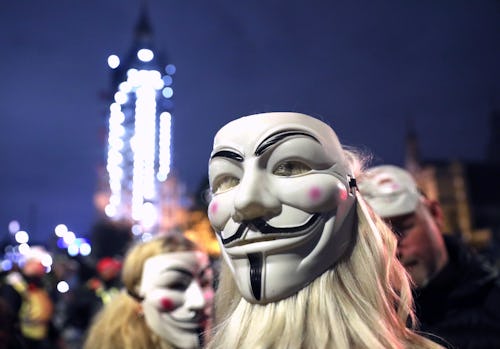
Anonymous, the infamous decentralized hacking collective, has launched a cyberattack against Russian Today, a government-owned Russian media publication. Or at least it says it has.
The @YourAnonOne Twitter account tweeted Thursday that the collective had “taken down the website of the #Russian propaganda station RT News.” Another popular Anonymous (@YourAnonNews) Twitter account shared a similar message: “RT.com is OFF FUCKING LINE.”
Other major Russian state-affiliated websites, including that of Gazprom, a major Russian oil giant, have also been forced offline since Russia’s invasion of Ukraine began. The official Russian government website has been down for at least a day now, too. Various Anonymous accounts have publicly taken responsibility for these cyberattacks, too.
Russian media executives, including Russian Today editor-in-chief Margarita Simonyan, have confirmed the cyberattacks. RT.com appears to have come back online at least briefly; at the time of this writing, it is unavailable once again.
Impossible to pin down —
It’s easy enough to confirm these websites are unavailable right now; it’s much, much more difficult to confirm who is responsible for taking them down. Only a person or group of people proclaiming their part in the attacks can lead us toward the antagonist.
When someone does step up, the question then evolves: How can we trust that they’re telling the truth? In Anonymous’s case, it’s essentially impossible to fact-check its claims. Anonymous is, well, anonymous. It’s many people in many places conducting individual activism actions. “Anonymous” as a whole did not complete this attack, though a skilled hacker (or a group of them) could have certainly done so without the rest of the collective even knowing about the action.
There’s no way for us to know whether or not Anonymous’s claims are true. Many of the collective’s accounts have been vocally pro-Ukraine since Russia began making moves; this alone could be considered proof that Anonymous would want to conduct these cyberattacks. But then again — perhaps the collective just wants us to think that’s the case.
Cyber warfare all around —
Anonymous’s claims are even more difficult to confirm than usual because the ongoing Russo-Ukrainian crisis is generally awash with cyber warfare.
Last week, as rumor of a Russian invasion grew ever-stronger, the websites of Ukraine’s army, defense ministry, and some major banks went dark following a series of cyberattacks. This week, a data-wiping program was installed on machines across Ukraine, with the capability of fully wiping a computer’s data. Even the U.S. is making sure it’s ready for the possibility of cyberattacks within its own borders.
Did Anonymous actually carry out these attacks? Only Anonymous knows — and, even then, not everyone in the collective will be in-the-know.







